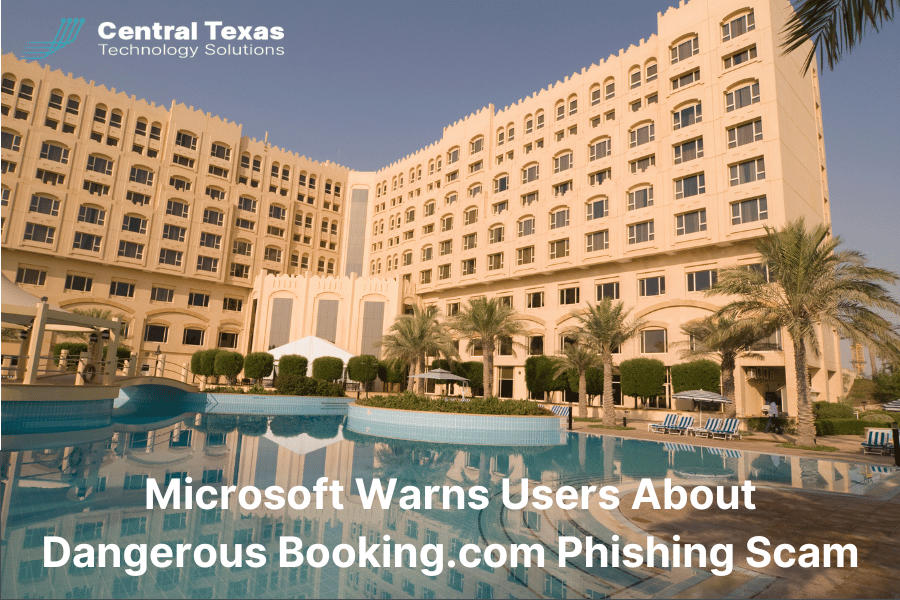
If your business operates in the hospitality industry, there’s a new cybersecurity threat that you can’t afford to ignore. Microsoft has issued a warning about a sophisticated phishing campaign that impersonates Booking.com and is actively targeting hotels, resorts, and travel-related companies around the world.
The consequences of falling victim to this phishing scam could be severe. From stolen customer data to compromised payments and damaged reputation, this attack is designed to hit hospitality businesses where it hurts most.
A Closer Look at the Booking.com Phishing Scam
According to Microsoft Threat Intelligence, this new campaign—dubbed ClickFix—relies on emails that appear to come directly from Booking.com. These phishing emails typically reference account verification issues or fake guest reviews, prompting recipients to click a link.
Once clicked, the link takes the user to a phony CAPTCHA page, followed by an error message. That message offers a supposed solution, but in reality, it's malware in disguise. When the malware is activated, hackers can steal login credentials and infiltrate your systems.
Once inside your network, they can:
-
Redirect payments meant for your business
-
Steal sensitive guest information
-
Access and manipulate reservations
-
Cause operational disruptions that take months to recover from
This isn’t just a poorly written spam email. The phishing messages are convincing, well-crafted, and often mirror the branding and tone used by Booking.com, making them even harder to spot.
Why the Hospitality Industry Is Being Targeted
Hotels and travel businesses handle large amounts of personal and financial data every day. That makes them an attractive target for cybercriminals. But beyond the financial risk, there's something even more important at stake—your reputation.
If your guests discover that their credit card or ID information was compromised due to a breach at your business, you risk:
-
Negative online reviews
-
Lost customer trust
-
Cancelled reservations
-
Legal consequences for mishandling sensitive data
In an industry built on guest satisfaction and trust, a phishing attack can deal long-term damage that’s hard to undo.
How to Protect Your Business from Phishing Attacks
The good news is that there are several effective steps you can take right now to guard against phishing scams like ClickFix.
1. Educate Your Employees
Your frontline defense starts with awareness. Train your staff to:
-
Be cautious of unexpected emails, especially those that create urgency
-
Watch for poor grammar, spelling mistakes, or suspicious sender addresses
-
Hover over links before clicking to verify their destination
-
Always report anything unusual to your IT team
2. Avoid Clicking Links in Suspicious Emails
Even if a message looks legitimate, never click embedded links without verifying the source. Instead, go directly to Booking.com through your browser and check for any alerts or issues within your account.
3. Strengthen Your Cybersecurity Tools
Collaborate with your IT provider to:
-
Enable advanced email filtering to block known phishing domains
-
Monitor login attempts and alert on abnormal behavior
-
Use multi-factor authentication (MFA) to protect critical logins
-
Regularly update and patch systems to reduce vulnerabilities
Stay Vigilant to Ongoing Threats
Phishing campaigns like ClickFix are becoming more advanced, more targeted, and more effective. The hospitality industry is particularly vulnerable due to the nature of the data it handles. But you are not powerless.
With the right training, proactive security, and an ongoing awareness of emerging threats, you can protect your business, your staff, and your guests.
Frequently Asked Questions About Phishing
1. What should I do if I think we clicked on a phishing link?
Immediately disconnect the affected device from the internet and notify your IT provider. Change all login credentials and monitor your systems for unusual activity.
2. How can I tell if an email from Booking.com is fake?
Check the sender's email address carefully. Booking.com emails typically come from verified domains. Watch for typos, unexpected urgency, and embedded links that redirect to unfamiliar URLs.
3. What industries are most vulnerable to phishing?
While phishing affects all industries, hospitality, finance, healthcare, and retail are especially at risk due to the high volume of sensitive data they manage.
Contact CTTS today for IT support and managed services in Austin, TX. Let us handle your IT so you can focus on growing your business. Visit CTTSonline.com or call us at (512) 388-5559 to get started!
